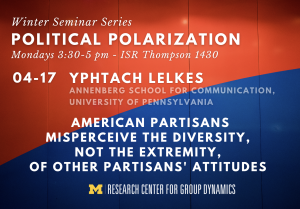Presented By: Research Center for Group Dynamics (RCGD)
RCGD Winter Seminar Series: American partisans misperceive the diversity, not the extremity, of other partisans' attitudes
Yphtach Lelkes

A popular explanation for rising partisan animosity and declining faith in democracy in the United States is that Republicans and Democrats misperceive each other to hold extreme policy attitudes. Yet, perceptions of group attitudes vary along other dimensions, and these perceptions are likely as important to democracy. In particular, Americans may underestimate the diversity of Democrats' and Republicans' attitudes to harmful effect. This paper uses surveys and pre-registered experiments with representative and convenience samples (N = 6,158) to assess the extent to which Americans misperceive that each party holds ``all the same'' attitudes and, furthermore, the consequences of these perceptions. Contrary to existing research, we find that American partisans do not consistently overestimate how radical the ``average'' Republican or Democrat is. However, Republicans and Democrats do vastly underestimate the diversity of each party's attitudes. Correcting these misperceptions of within-party attitude diversity reduces partisan animosity and the perceived threat posed by the opposing party.